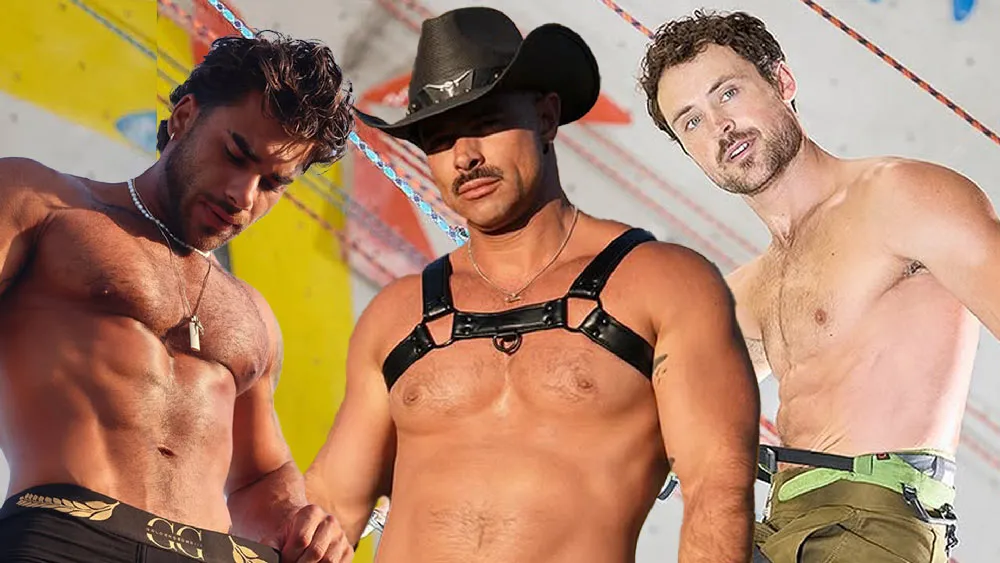June 5, 2012
Bear Nation
Steve Weinstein READ TIME: 3 MIN.
The problem with Bear Nation becomes most apparent when Kevin Smith is given a lot of screen time. Smith, the iconoclastic director of films such as "Clerks," "Mallrats," "Chasing Amy" and "Zack and Miri Make a Porno," is expounding on all things "bear." Filmed in his quirky store in New Jersey, the portly Smith explains how a gay friend got him to co-pose for the cover of a bear magazine, which began the straight film director's path to becoming a bear icon.
Smith makes some nice points about how the much-discussed "ick factor" attitude by non-gay men about anal sex plays into the whole bear mystique. He also repeats points he has made elsewhere about how refreshing he, after having been rejected or ridiculed all his life for his size, found the self-acceptance of the bear community so uplifting.
Even so, with all that screen time, Smith -- who, not coincidentally, also served as the executive producer of Malcolm Ingram's documentary -- never addresses what relevance the acceptance he and other straight men who have embraced --�and been embraced by -- bears might have on their own lives and what impact it might have on the larger culture.
In 2010, writer Joe Erbentraut analyzed the phenomenon of the "straight bears" in the Village Voice. These men, the bear equivalent to the "Queer Eye for the Straight Guy," metrosexual-type stag hags who pal with the mainstream gay boys, are in turn beginning to challenge straight assumptions about fat men the same way the bears stood up to what they saw as the tyranny of the chiseled, hairless, muscular, perfectly groomed and dressed "Chelsea boy."
The problem with "Bear Nation" is that it continually stops at its own borders. Sure, there are few tiny excursions into sound bites from female passersby or hotel workers who giggly try to describe the mass of man flesh parading before them. And there's an utterly extraneous segment (not the only one, alas), in which some denizens of a rural Northwest town describe real bears.
I understand that, like nearly all documentary filmmakers these days, Malcolm Ingram had only limited resources. But if he could afford to go on location to Chicago and London to cover big bear events, couldn't he have filmed more than four or five men? Instead, it's the burden of these talking heads to encompass the history, attraction and controversies surrounding the bear "community" --a word, by the way, heard over and again, and like other employments of the word, is continually undercut by descriptions of internecine warfare.
Yes, there is ongoing and seemingly endless controversies among bears, whose fondness for group self-analysis might parallel the world-historical statement many of them seem to believe that they are making. Ingram, to his credit, allows his talking heads space to deal with issues like ostracism of the hairless, the thin or the muscular.
But if he can include footage (which I found obnoxious) of a self-described "twink," it wouldn't have been so hard to find some of those mainstream gay men and get their take on the bear scene. Or even, maybe, an academic or two -- many of whom have studied the bear scene? If nothing else, the widespread notion that bears are promulgating unhealthy eating habits is something that one would think have to be addressed in a rounded documentary.
Instead, what we get too much of is the intellectual version of a circle jerk -- bears and bear admirers waxing poetic about the objects affections or lust. More expert observers could have served as correctives to some of what these people say --�such that thinness triumphed over girth only since the 1960s. (Not true, in the 1920 and '30, women were thinner than they are now --�and for earlier eras, just remember Scarlett O'Hara's shame at losing her 17-inch waist.)
What disturbed me most, however, was that, if I were to judge the bear community only from this film, I would believe that they see mainstream gay men as limp-wristed, label-obsessed attitude queens. All Jacks, and no Wills. The truth is far more nuanced, of course. That rainbow flag may not show it, but there are hues and shades of each of the larger colors.
Like the bears themselves, the rest of gay life exists in a multiplicity of styles. The fact that these men felt rejected by the larger gay world is sad, and the way they have built a self-accepting society is inspiring. But please stop pushing the notion that your lifestyle represents what's "normal" and that you represent "real guys."
The DVD edition contains even-more extensive unedited interviews with some of the talking heads.
Bear Nation
DVD
$19.95
http://www.kinolorber.com/
Steve Weinstein has been a regular correspondent for the International Herald Tribune, the Advocate, the Village Voice and Out. He has been covering the AIDS crisis since the early '80s, when he began his career. He is the author of "The Q Guide to Fire Island" (Alyson, 2007).







